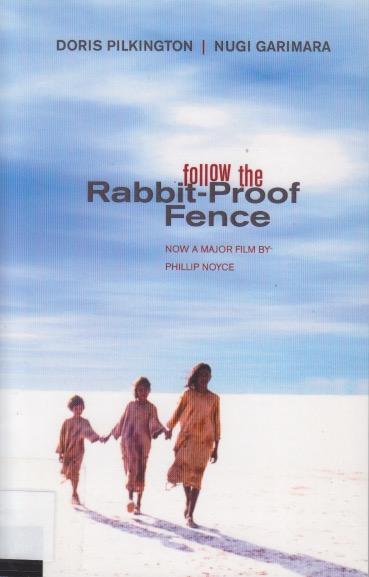
One thing fascists around the world are attempting to do is rewrite history. Inevitably white, they want to paint themselves as good and superior. Actual history, however, shows just how destructive and cruel “civilization” has been, particularly to original inhabitants of colonized nations. Over the past several months I’ve been reading about indigenous peoples. We’ve been led to believe they were unfortunately wiped out, that they no longer really exist, or that our governments treat them fairly to make up for past injustices. Such myths must be dispelled and we need to hear from those who’ve lived their experiences. Follow the Rabbit-Proof Fence by Nugi Garimara, or Doris Pilkington, is the record of one such remarkable experience. Although made into a film in Australia, it’s a story with which I was unfamiliar.
Garimara is the daughter of an indigenous aboriginal woman who experienced life under the “civilizing” of West Australia. Molly, the author’s mother, and two of her sisters—Daisy and Gracie—were separated from their family at the ages of 14, 11, and 8, respectively. They were sent 1600 kilometers—very nearly 1000 miles—away to a school that was run as if the government believed Jane Eyre was an instruction manual. Although they knew that runaways, who were always caught, were shaved, whipped, and put in an on-campus jail on bread and water, Molly decided to escape with her sisters. Over nine weeks they managed to avoid the trackers and walk the 1000 miles home. This all took place in 1931. Follow the Rabbit-Proof Fence is an engrossing book that should be widely read.
Many questions remain. Since the story is written from the memories of an aging Molly, there are gaps. After making it home Gracie was “captured” and sent back to the school. Molly was eventually tracked down and also returned, but she again escaped and followed the same route back home. The authorities, implacable, believed that whites knew the best way to handle indigenous peoples, calling the department responsible “the Protector of Aborigines.” We need to listen to the voices of those whose land was stolen. We need to ask them how to make current circumstances more just and fair. Yes, the indigenous lifestyle clashes with capitalism. We’re becoming aware that their lifestyles tends to be healthier and more fulfilling, and yet we persist. We are, it seems, living through the slow crumble of the capitalistic system. When it all comes down we would be wise to learn from those who know alternative ways of being in the world and can find their way home in hopeless circumstances.
